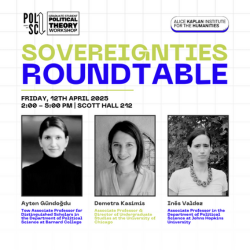
Please join the Graduate Student Political Theory Workshop and Kaplan Sovereignties as they host Profs. Ayten Gündoğdu (Barnard College) and Demetra Kasimis (University of Chicago), and Inés Valdez (Johns Hopkins University) on sovereignties and their contestation. We will be discussing different conceptions of sovereignty – conceptual, territorial, institutional, etc. – and their relation to mobility, rule, borders, and the nation-state. Moreover, we will ask whether recent political events point to a destabilization or a (re-)establishment of sovereignty, and how our very understanding of politics might be imbricated with the manifold meanings of sovereignty. Drinks and snacks will be provided. This event is co-sponsored by the Alice Kaplan Institute for the Humanities.
Ayten Gündoğdu is the Tow Associate Professor for Distinguished Scholars in the Department of Political Science at Barnard College. Her research lies at the intersection of modern and contemporary European political theory, the political thought of Hannah Arendt, critical human rights studies, and international political and legal theory. Professor Gündoğdu's research aims to rethink key political concepts such as equality, rights, sovereignty, and personhood in light of the struggles of subjects relegated to the margins of politics and law. This goal is reflected in her book, Rightlessness in an Age of Rights (Oxford University Press, 2015), which offers a critical inquiry of human rights by engaging with the works of twentieth-century political theorist Hannah Arendt and by examining the contemporary rights struggles of asylum-seekers, refugees, and undocumented immigrants. The book presents new readings of Arendt’s key concepts (e.g., “the social,” “the right to have rights”) by rethinking them within the context of immigration detention, deportation, refugee camps, and struggles for regularization.
Demetra Kasimis teaches and writes about democracy and its dilemmas in ancient and contemporary contexts. She is interested in what makes a productive engagement with antiquity and specializes in problems of migration and political membership; gender and kinship; democratic instability and conspiracy; and interpretive method. Most of her work combines the insights of classical Greek thought with the critical tradition of continental political thought that examines formations of power and political identity. She holds a B.A. and M.A. from Columbia University, where she studied philosophy and Hellenic Studies, and a Ph.D. in political science from Northwestern. At Chicago, she is an associated faculty member of the Department of Classics, a member of the affiliated faculty and board of the Center for the Study of Gender and Sexuality, and a fellow of the Chicago Center for Contemporary Theory (3CT). Her research has been funded by the National Endowment for the Humanities, the American Council for Learned Societies, the Mellon Foundation, and the Fulbright Foundation. She is an editor of the journal Contemporary Political Theory.
Inés Valdez is a political theorist and Associate Professor at Johns Hopkins University. Her research on critical race and feminist theory, migration, transnationalism, empire, and racial capitalism. Her research has been supported by the Humboldt Stiftung, the Global Arts & Humanities Society of Fellows, the Princeton University Center for Human Values, and the Max Weber Programme. Her forthcoming book Democracy and Empire: Labor, Nature, and the Reproduction of Capitalism (Cambridge UP) theorizes the material underpinnings of popular sovereignty through an engagement with the Black radical tradition. Popular bonds contain an affective attachment to wealth and a collective agreement to dominate others abroad to secure that wealth, turning self-determination into an excessive entitlement to dominate others. The book integrates racial capitalism with popular rule and self-determination, noting limits of existing accounts and illustrates two material conditions of popular sovereignty: social reproduction obtained through the destruction of kinship of Latino families, and the violent joint conscription and destruction of nature and manual labor in the Global South. In closing, the book conceptualizes an anti-imperial popular sovereignty that embraces ecological responsibility and reciprocity to ground transnational solidarity.
Audience
- Faculty/Staff
- Graduate Students
Interest
- Academic (general)